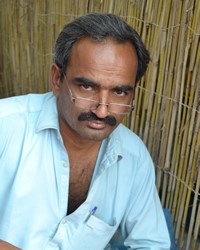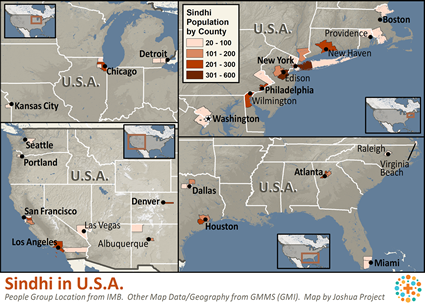All Sindhi were originally from the southeastern province of Pakistan, Sindh. Many Hindu and Sikh Sindhi left Pakistan for India after the 1947 Partition. Some of these Hindu Sindhi have migrated to the USA. Besides Pakistan and India eight other countries have Sindhi populations.
Some Sindhi in the USA have retained their language of Sindhi at home while speaking English on the job or at school. Some speak English at home and as their first language now.
In Pakistan and India most Sindhi work in agriculture and animal husbandry. In the USA, American Sindhi work a variety of jobs. Some work in the professions in medicine, science, finance and education. Some work as teachers, managers, in retail and in administration. Many have lent their talents to America as computer scientists. Social division exists on the basis of occupation and income.
Most parents and grandparents want their children to retain their Sindhi heritage, and language. Many Sindhi young people are indistinguishable from other young Americans. In Pakistan, Sindhi parents often choose the spouse of their son or daughter. In the USA, young people choose their own mates. These partners are frequently not from the Sindhi culture.
Like many diaspora groups in the USA, the Sindhis have their own association to preserve their culture and language. It is called the Sindhi Association of North America (SANA). One of their goals involves protecting the rights of Sindhi people in Pakistan.
Almost all Sindhi in the USA claim that they are Hindus. They pay their primary devotion to Shiva, the destroyer god and to the Mother Goddess Durga. Upon arriving in the USA, many Sindhi become secular and Hindu in name only. American Sindhi celebrate both Hindu and American holidays.
Hinduism is the ancient religion of India. Hinduism is a catch-all phrase for the local religions of South Asia, so it is very diverse. At the popular level, Hindus worship and serve the gods of the Hindu pantheon. They visit Hindu temples and offer prayers, food, flowers, and incense to their gods in hopes of gaining protection and benefits. They do not have a personal or familial relationship with their gods like Christians. There are other Hindus who are much more philosophical, especially among the Brahmins.
Almost all Hindus participate in yearly celebrations like Holi, the festival of colors and the start of spring, Diwali, the festival of lights, Navratri, the celebration of autumn, and Rama Navami, Rama's birthday. American Sindhi celebrate both Hindu and American holidays.
Many Sindhi in the USA may enjoy economic prosperity. They will always lack spiritual “prosperity” until they turn to Jesus Christ. Only a tiny fraction of American Sindhis claims to be followers of Jesus Christ.
Pray that each individual of the Sindhi community will increasingly realize his or her opportunity to know forgiveness of sin and a new life found in Jesus Christ.
Pray that believers in the USA will reach out and build relationships with their Sindhi neighbors.
Pray that American Sindhis would develop a spiritual hunger that would lead them to read the Bible.
Pray for a movement to Christ among the American Sindhis that will spread to South Asia.
Scripture Prayers for the Sindhi in United States.
https://en.wikipedia.org/wiki/Sindhi_Americans
https://www.worldsindhicongress.org/2011/01/hundreds-of-sindhi-americans-gathered-in-houston-to-pay-tribute-to-their-national-leader/
https://web.archive.org/web/20100711065104/http://www.sanalist.org/sana/newsite/
https://sanaonline.org/
| Profile Source: Joshua Project |


























